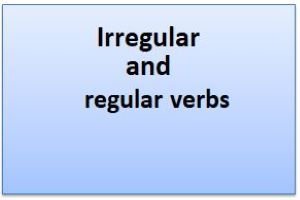Regular and irregular verbs definition:
Regular verbs:
In English, when we add -ed to the base form of verbs to create past simple and past participles and add will to its base form for future tense such verbs are called regular verbs.
- Peter begs for your help.
- Peter begged for your help.
- Peter will beg for your help.
We convert the -y to -I and add -ed if the verb ends to -y and consonant. As in:
- James replies to you.
- James replied to you.
- James will reply to you.
We just add -d to a verb that ends in -e, as in:
- The clown amuses the children.
- The clown amused the children.
- The clown will amuse the children.
Irregular verbs:
In English, there are roughly 200 irregular verbs. We can categorize them into four groups depending on the changes in their verbs in the different tenses.
- Irregular Verbs with Different Forms in Every Tense.
- Irregular Verbs With the Same Past Tense and Past Participle
- Irregular Verbs That Only Change in Past Tense.
- Irregular Verbs That Never Change
In every tense, these irregular verbs have different forms:
It is very difficult to learn those irregular verbs that have different past tense, present tense, and past participle forms.
| Present Tense | Past Tense
|
Past Participle
|
| Do
|
Did
|
done
|
| Eat | Ate
|
eaten |
| Go | Went | gone |
| Have | Has | had |
| See | Saw | seen |
I eat an apple. ( in present tense )
I ate the apple. ( in past tense )
I have eaten apples. ( past participle )
Irregular Verbs with the Same Past Participle and Past Tense:
Some irregular verbs don’t change in each tense; thus, these types of irregular verbs only change once. Their past tense and past participle remain the same, which makes deciding how to conjugate them a little easier. For example, the verb “buy” becomes:
- I buy old books. (in present tense)
- I bought old books. (in the past tense.)
- I have bought old books. (in the past participle.)
| Present Tense | Past Tense | Past Participle |
| Keep | Kept | Kept |
| Find | found | Found |
| Make | Made | Made |
| Win | won | Won
|
| Say | Said | Said |
Irregular verbs always change to the past tense.
Few irregular verbs have identical present forms and past participial forms of tenses, however not the same past tense form. We have only four irregular verbs that follow in this category.
Check the chart below.
| Present Tense | Past Tense | Past Participle |
| Become | Became | Become |
| Come | Came | Come |
| Run | Ran | Run |
| Overcome
|
Overcame | Overcome
|
Let us consider the verb “come” in all three tenses below.
- They come together every day. (Come in the present tense.)
- They came together last Saturday. (Came in past tense.)
- They have come together for years. (Come in past participle.)
Irregular Verbs That Never Change:
Most of these verbs end in -t, so they are simpler to spot and easily identify, so they cannot be confused. Take the example of the verb to ‘cut’ which remains:
- I cut the banana for you. (in present tense)
- I cut the banana yesterday. (in past tense)
- I have cut the banana before. (in past participle)
| Present Tense | Past Tense | Past Participle |
| Set | Set | Set |
| Fit | Fit | Fit |
| Let | Let | Let |
| Set | Set | Set |
| Put | Put | put |

